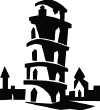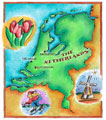|

The culture of Europe might better be described as a
series of overlapping cultures of Europe. Whether it is a question of West as opposed to East; Catholicism and Protestantism
as opposed to Eastern Orthodoxy; Christianity as opposed to Islam; many have claimed to identify cultural fault lines across
the continent.
European culture also has a broad influence beyond the continent of Europe due to the legacy of colonialism. In this
broader sense it is sometimes referred to as Western Civilization. Nearly all of the Americas were ruled by European powers
at one time or another, and some parts of the New World, such as French Guiana, still are. The vast majority of the population
of the Americas speak European languages, specifically Spanish, English, Portuguese, French and to a much lesser extent Dutch.
Additionally the cultures of the European colonial powers (Spain, Britain, the Netherlands, Portugal, Belgium and France)
exert a strong influence.
Since there are so many nation states throughout Europe it would be too difficult to explain the culture of each one. The Netherlands
will be the nation we look at for our European example.
The Neretherlands
Dutch culture or culture of the Netherlands is diverse, reflecting regional differences
as well as the foreign influences thanks to the merchant and exploring spirit of the Dutch. The Netherlands and Dutch people
have played an important role for centuries as a cultural center.

The main language is Dutch, while Frisian is also a
recognized language and it is used by the government in the province of Friesland. Several dialects of Low Saxon are spoken
in much of the north and east and are recognized by the Netherlands as regional languages according to the European Charter
for Regional or Minority Languages.
Dutch society is egalitarian and
modern. The people are generally modest, tolerant, independent, self-reliant, and entrepreneurial. They value ambition, education,
hard work, and personal achievement. The Dutch have an aversion to the nonessential. Ostentatious behavior is to be avoided.
Accumulating money is fine, but spending money is considered something of a vice and highly associated with being a show-off.
A high style is considered wasteful and suspect. The Dutch are very proud of their cultural heritage, rich history in art
and music and involvement in international affairs.
The Netherlands is one of the most secular countries
in Europe. An estimated 40% of the population (1998) call themselves non-religious. The remaining are 31% Roman Catholic,
21% Protestant, and 4.4% Muslim. Protestantism used to be the largest religion in the Netherlands. However, over the past
century the older Protestant churches have been in decline. Islam has begun to gain a foothold and mosques are being built.
The Netherlands is also home to a significant Hindu minority, mostly made up of migrants who came from former colony Suriname
after its independence.

European Commission
A guide to European culture
Dutch Ministry of Education, Culture and Science
|

